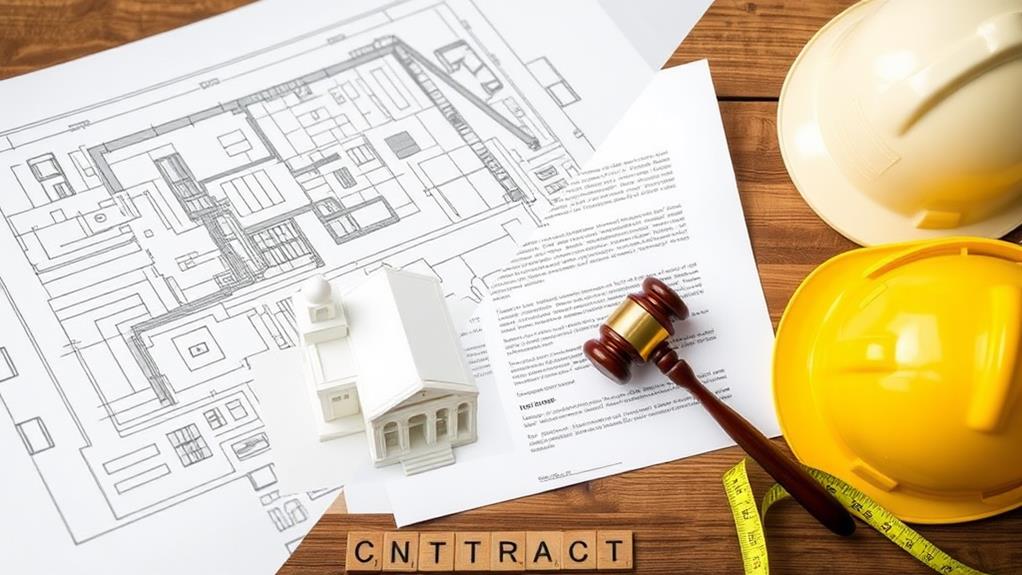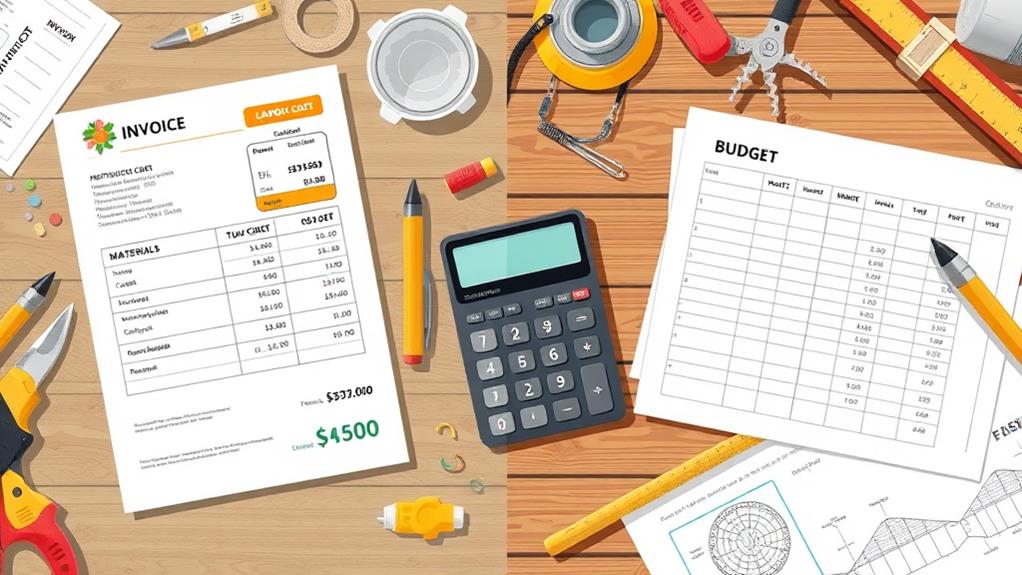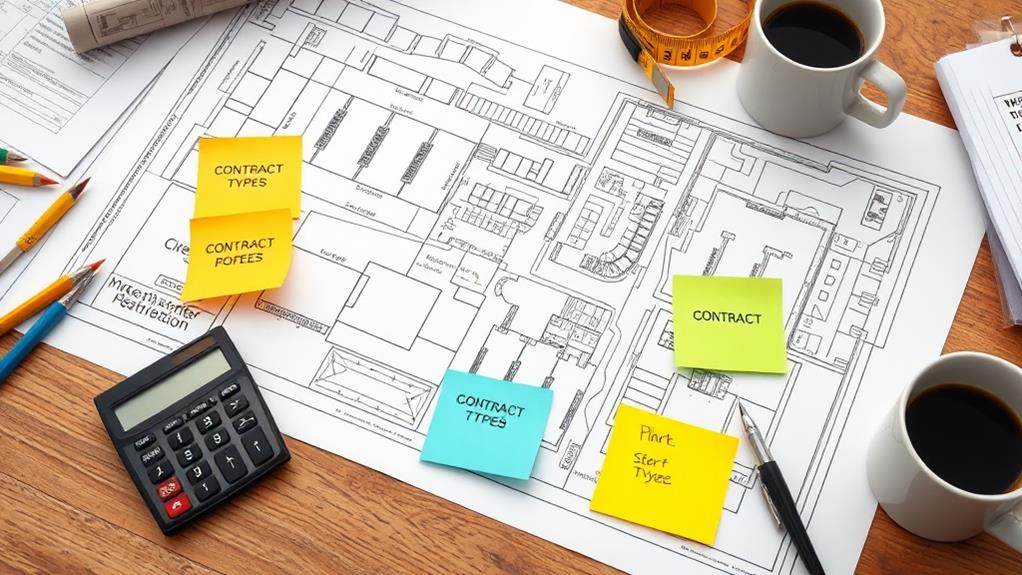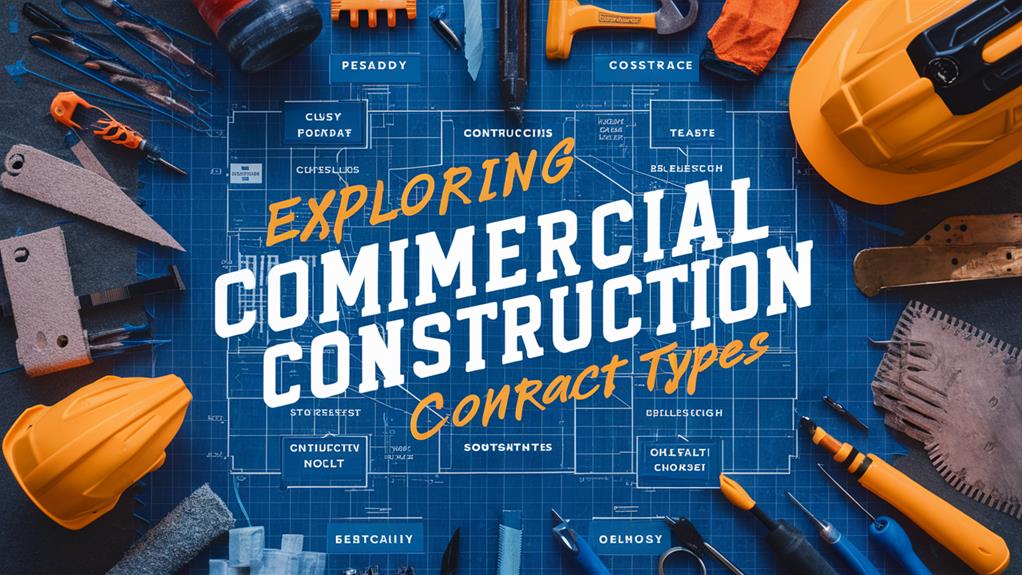When exploring commercial construction contract types, you'll encounter various options that can shape your project's outcome. Fixed-price contracts set a total cost upfront, minimizing risk for the contractor. Cost-plus contracts reimburse actual costs plus a fee, offering flexibility for changes. Time and materials contracts pay for labor and supplies, adapting to uncertain project scopes. Each contract type has specific terms regarding payment, timelines, and responsibilities. Choosing the right contract depends on your project's clarity, budget, and goals. Understanding these details is crucial for avoiding unexpected issues and ensuring project success, which leads to further insights on this topic.
Overview of Construction Contracts

Construction contracts are the backbone of any building project, ensuring that both property owners and contractors have a clear understanding of their roles and responsibilities. These essential agreements outline the project scope, payment schedules, and expectations, which help protect both parties from disputes.
In the construction industry, there are various contract types, including time and materials, cost-plus, and guaranteed maximum price contracts, each designed for different conditions and risk management needs. Effective project management services not only aid in selecting the right contract type but also ensure that all parties are aligned throughout the project lifecycle.
Choosing the right contract type can significantly impact a project's expenses and potential profits. No single universal contract fits all construction projects, so it's important to select different contracts for various phases to enhance flexibility and tackle unique challenges.
Thoroughly reading and understanding contract stipulations is vital for successful project management. Inadequate contracts can lead to significant legal issues and financial risks for both contractors and property owners.
Dispute resolution is another key aspect of construction contracts, providing a structured approach to handle conflicts if they arise. By understanding these elements, you can better navigate the construction process, ensuring a smoother experience for everyone involved.
Lump Sum and Unit Price Contracts
When managing a construction project, understanding the differences between lump sum and unit price contracts is crucial for effective budgeting and risk management.
Lump sum contracts involve a fixed total price agreed upon at the project's start, which is great for projects with a well-defined scope of work. This makes budgeting straightforward, but if the project scope changes, it can lead to complications and disputes over additional costs. Projects like office buildings designed for functionality and aesthetics often benefit from this type of contract.
On the other hand, unit price contracts set a price per unit of work completed. This approach offers flexibility for projects with variable quantities, like those involving repetitive tasks. However, it requires careful tracking of actual quantities to ensure accurate billing and prevent financial discrepancies.
In lump sum contracts, contractors bear the risk of cost overruns, which means they might end up spending more than expected. Conversely, unit price contracts shift some risk to owners, who mightn't know the total project costs upfront, even though they understand the unit prices.
Time and Materials vs. Cost-Plus Contracts

Two commonly used contract types in commercial construction are time and materials contracts and cost-plus contracts.
Time and materials contracts focus on reimbursing contractors for labor at agreed hourly rates plus material costs with a markup. This approach offers flexibility in projects where the scope might change, making it suitable for unpredictable situations. Moreover, as the urban transformation in NYC continues, these contracts can be particularly advantageous for projects that require quick adaptations.
On the other hand, cost-plus contracts reimburse contractors for actual construction costs plus a predetermined fee or percentage. While this encourages transparency, it can lead to higher overall costs if not managed closely.
Both types require meticulous tracking of costs and hours to ensure accurate billing and to prevent budget overruns. Time and materials contracts often include a not-to-exceed clause, which offers some budget protection for owners. Conversely, cost-plus contracts can have a guaranteed maximum price, limiting total expenses.
When choosing between these two contract types, consider the project's clarity. If the project scope is unclear, time and materials contracts provide flexibility. However, if you prefer cost predictability and are willing to monitor expenses closely, a cost-plus contract might be the better choice.
Understanding these options helps you make informed decisions for your construction project.
Guaranteed Maximum Price Contracts
Guaranteed Maximum Price (GMP) contracts offer a compelling option for project owners seeking cost control and efficiency. With a GMP contract, you set a ceiling on project costs, which protects you from overruns. This ensures that the contractor absorbs any costs beyond the guaranteed maximum price, promoting effective financial management.
It's essential, though, that you work with a well-defined scope, as these contracts thrive on clarity. To avoid disputes and minimize change orders, you need detailed project plans finalized before construction begins. This upfront planning encourages contractor accountability and helps keep the project on track.
However, remember that contractors must maintain comprehensive accounting records. While this adds some administrative costs, it enhances transparency and ensures you can review finances easily.
GMP contracts are particularly beneficial in construction contract types for projects where you need certainty in budgeting. With the right planning and collaboration, these contracts can lead to successful outcomes, keeping both your budget intact and the contractor motivated to control project costs.
Additional Considerations in Contract Selection

Selecting the right construction contract requires careful consideration of your project's unique goals, such as cost control and flexibility.
It's essential to evaluate various factors that can influence your decision, ensuring a smooth construction process.
- Assess the clarity and complexity of your project scope, as this will affect your choice between fixed-price contracts like lump sum and flexible options like time and materials.
- Evaluate the contractor's experience and reliability, as selecting contracts that align with their strengths can significantly impact your project's success.
- Ensure compliance with local regulations and legal requirements to minimize disputes. Using standardized contracts recognized in your jurisdiction can help with this.
- Consider how you'll manage changes and adjustments during the project. Contracts like cost-plus and Guaranteed Maximum Price (GMP) can provide a framework for addressing unforeseen circumstances effectively.
Choosing the Right Contract Type
When it comes to choosing the right contract type, understanding your project's specific needs is key. Different contract types serve various purposes. For well-defined projects, lump sum contracts offer clear budgeting but can lead to profit erosion if costs exceed estimates.
On the other hand, cost-plus contracts provide flexibility, making them ideal for projects with uncertain or evolving scopes, though they can result in unpredictable total costs.
If your project involves repetitive tasks, consider unit price contracts, which simplify billing by adjusting costs based on actual quantities. This approach is especially beneficial in public works and infrastructure projects.
Alternatively, Guaranteed Maximum Price (GMP) contracts protect owners from cost overruns by capping expenses while incentivizing contractors to manage costs effectively. This makes GMP contracts suitable for projects with known challenges.
The choice of contract type impacts cash flow management and billing processes. Some contracts require meticulous tracking of hours and materials, while others simplify these processes.
Conclusion
In conclusion, choosing the right construction contract type is like selecting the perfect tool for a job. Each type, whether it's a lump sum or a cost-plus, has its strengths and weaknesses, just like a hammer or a wrench. By understanding these options, you can ensure your project runs smoothly and stays on track. So, take the time to weigh your choices carefully, and watch your construction dreams come to life, brick by brick.


Leave a Reply